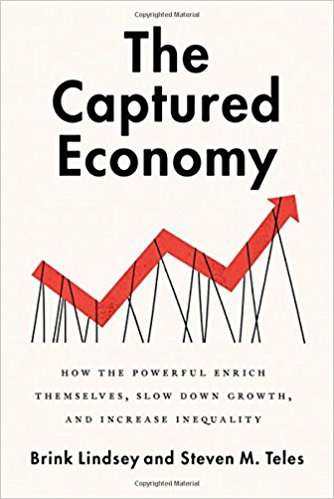The Volokh Conspiracy
Mostly law professors | Sometimes contrarian | Often libertarian | Always independent
Cato Unbound Symposium on "The Captured Economy"
The symposium focuses on Brink Lindsey and Steve Teles' important new book describing how several forms of government regulation slow economic growth, increase inequality, and reduce opportunities for the poor.

The Cato Unbound website is hosting a symposium on Brink Lindsey and Steve Teles' important new book, book The Captured Economy, which argues that the "capture" of government regulation by wealthy interest groups has slowed economic growth, increased inequality, and reduced opportunity for the poor. Here is a brief excerpt from Lindsey and Teles' lead essay:
Our book The Captured Economy is small, but it addresses a big topic, which is the confluence of sluggish growth and spiraling inequality. Most of the book gets down in the weeds of regulatory policy, showing the ways that financial regulation, intellectual property protection, occupational licensing, and zoning have redistributed income upward while inhibiting economic dynamism. But underneath all the wonkery is an argument for moving away from the current left-right divisions that have characterized our politics for the last few decades, and toward what you could call "limited big government…"
[P]olitics can usefully be understood along both a "scope of government" and a "character of governance" dimension. The Captured Economy fits in the space that accepts the normative case for big government, but recognizes that the potential pathologies of governance call for constitutional and other limits on state action that push public policy toward the most effective, public-spirited, and democratically comprehensible forms. In this vision, the most important limits on government are not those that try to constrain the size or scope of government but those that shape the character of state action.
Here is an excerpt from my response essay:
Brink Lindsey and Steve Teles have written an excellent book that outlines several ways in which we can simultaneously help the poor and disadvantaged and increase economic growth by reducing government regulation. Lindsey and Teles also correctly diagnose a major cause of harmful government policies in these areas: widespread public ignorance makes it difficult for voters to effectively monitor complex regulatory policies. Unfortunately, they too quickly reject what is often the best strategy for combating regulatory capture: reducing the size and scope of government. We can also empower people to make better decisions by giving them greater opportunities to "vote with their feet." Some of the reforms advocated by Lindsey and Teles can greatly expand foot voting….
Lindsey and Teles explain how capture has led to harmful regulatory policies in the fields of finance regulation, intellectual property, zoning, and licensing….
Lindsey and Teles argue that we can make government simpler and more transparent without reducing the range of its functions. But this is highly unlikely. So long as local, state, and federal governments continue to spend nearly 40 percent of GDP and regulate nearly every aspect of society, it is inevitable that their activities will be highly complicated and provide many opportunities for interest groups to exploit public ignorance. There just isn't any simple and clear way to regulate and control so much. And voters cannot effectively monitor more than a small fraction of all this government activity.
Over the next few days, there will also be response essays by Brookings Institution scholar Richard Reeves and political scientist Henry Farrell. I previously reviewed The Captured Economy here. Part of my Cato Unbound response essay is adapted from the earlier review.
Editor's Note: We invite comments and request that they be civil and on-topic. We do not moderate or assume any responsibility for comments, which are owned by the readers who post them. Comments do not represent the views of Reason.com or Reason Foundation. We reserve the right to delete any comment for any reason at any time. Comments may only be edited within 5 minutes of posting. Report abuses.
Please to post comments


Somin has been wrong on this point for a long time, but he refuses to admit it.
Here is a thought experiment that illustrates it. Imagine that the government eliminated the so-called war on drugs but then increased spending on Social Security by an amount that was modestly greater than the cost savings. Wouldn't that be an overall increase in liberty?
Or what if restrictive zoning was reigned in, but at the same time, education spending increased by an amount modestly more than the savings with the introduction of a voucher system so parents could choose any school they wanted for their children. Wouldn't that be an overall increase in liberty?
In both of these examples, the amount of money that the government is spending actually increases. But I think that it is fairly clear that both transitions would be liberty increasing.
Somin seems to think that size is what matters. But, in reality, it is character. Lindsey and Teles indisputably have the better of this argument.